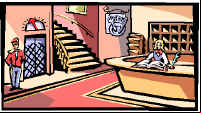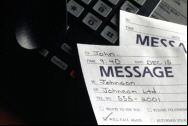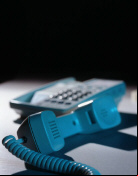516o20
CMO HABLAR POR TELFONO EN INGLS
Una conversacin telefnica en ingls requiere de ciertos convencionalismos (sobre todo si se trata de un entorno comercial o de negocios) y tiene la dificultad aadida de no poder interactuar directamente con nuestro interlocutor.
Vamos a facilitarte una serie de tcnicas y de recursos que te ayudarn a la hora de mantener una conversacin de forma fluida y efectiva.
En esta Gua se plantean tambin algunos casos prcticos en forma de ejercicios. El objeto de los mismos es facilitar que puedas ejercitar los planteamientos tericos que se exponen.
En esta Gua tambin hemos incluido diversos ejemplos en audio que puedes escuchar a travs de los iconos ![]() o
o ![]() . Si tienes problemas para escuchar, consulta las FAQ.
. Si tienes problemas para escuchar, consulta las FAQ.
Dispones de las soluciones a ejercicios propuestos a travs de los iconos ![]() o
o ![]()
Esta Gua es una referencia para perfeccionar un apartado concreto del ingls conversacional y supone que dispones al menos de un nivel intermedio. Si tienes dificultades, puedes seguir nuestros Cmo aprender Ingls sin esfuerzo.
1) DELETREAR (Spelling)
Vas a tener que recurrir muy habitualmente a deletrear nombres, direcciones, etc., por lo que es necesario que tengas fluidez en la pronunciacin de las letras del alfabeto o de los nmeros en ingls:
ESCUCHA LA PRONUNCIACIN DEL ALFABETO EN INGLS.
Debes familiarizarte con la pronunciacin del alfabeto ingls, por lo que es conveniente que lo escuches tantas veces como necesites.
 |
 |
 |
 |
 |
 |
 |
 |
 |
 |
 |
 |
 |
 |
 |
 |
 |
 |
 |
 |
 |
 |
 |
 |
 |
 |
 |
 |
 |
 |
 |
 |
 |
 |
 |
 |
 |
 |
 |
 |
 |
 |
 |
 |
 |
 |
 |
 |
 |
![]() Escucha las letras del alfabeto ingls y reptelas.
Escucha las letras del alfabeto ingls y reptelas. ![]()
| |
|
|
|
|
|
|
||||||
| A | B | F | I | O | Q | R | ||||||
| H | C | L | Y | U | ||||||||
| J | D | M | W | |||||||||
| K | E | N | ||||||||||
| G | S | |||||||||||
| P | X | |||||||||||
| T | Z | |||||||||||
| V |
![]() Escucha y lee el siguiente dilogo en un hotel
Escucha y lee el siguiente dilogo en un hotel ![]()
| Lo fundamental en este dilogo es que veas una aplicacin prctica del spelling (deletreo) muy comn en los pases de habla inglesa pues, a diferencia del espaol, la representacin escrita y la pronunciacin figurada de las palabras en el idioma ingls puede ser muy distinta. |
| R=Recepcionista A=Angeles R - Good afternoon. Can I help you? |
ESCUCHA LA PRONUNCIACIN DE LOS NMEROS EN INGLS.
Debes familiarizarte con la pronunciacin de los nmeros en ingls, por lo que es conveniente que lo escuches tantas veces como necesites.
![]() Lee los nmeros, escchalos y reptelos
Lee los nmeros, escchalos y reptelos ![]()

![]() Whats your phone number? /Cul es tu nmero de telfono?
Whats your phone number? /Cul es tu nmero de telfono?
 - Cmo se dice el nmero cero (zero) en ingls?
- Cmo se dice el nmero cero (zero) en ingls?
- Cmo se dicen dos nmeros iguales que van juntos?
- 0715 255 6099
My phone number is
Her phone number is
His phone number is
Their phone number is
My credit card number is 
- Mr. Se usa en general para hombres, independientemente de su condicin de casados o solteros.
- Ms. Significa "seora", "seorita". Se utiliza cuando nos referimos a una mujer e ignoramos su estado civil (si est casada o no)
Es la forma ms comn para referirnos a una persona del sexo femenino. Generalmente se usa junto con el apellido o con el nombre y apellido.
- Mrs. Significa "seora". Se utiliza cuando nos referimos a una mujer casada. Es un trmino formal. Generalmente, se usa junto con el apellido de casada (en los pases anglosajones, la mujer casada suele adoptar el apellido del marido).
- Miss. Significa "seorita". Se utiliza cuando nos referimos a una mujer soltera. Es un trmino formal. Generalmente, se usa junto con el apellido o con el nombre y apellido.
3) REGLAS GENERALES EN UNA CONVERSACIN TELEFNICA
- Siempre identifcate previamente a ti mismo y a tu empresa (en caso de que la conversacin est enmarcada dentro de un contexto comercial).
- Habla de forma pausada. Ello ayudar a que tu interlocutor te entienda mejor y a que l tambin hable en un tono ms comprensible.
- Habla siempre con correccin. En general, es una recomendacin vlida para cualquier contexto pero en una conversacin en ingls es habitual que la misma se desarrolle en un tono respetuoso.
- Dirgete a tu interlocutor siempre con su apellido y tratamiento si no tienes suficiente confianza.
4) CONTEXTO GENERAL DE UNA CONVERSACIN TELEFNICA
- Dentro del contexto de una conversacin telefnica, hay un conjunto de palabras y frases habituales que generalmente debers emplear y que te ser de gran utilidad conocer.
![]()
Identifying yourself
Hi, it’s ……… speaking.
Hello, This is ……..
Good morning, my name’s ……..
Reason for phoning
I’m ringing to let you know…..
to ask if…..
to find out if…..
because I was wondering if…..
Asking for people
Could you put me through to …………, please?
I’d like to speak to ………
Is ……… there, please?
Asking for things
Could you…..(+infinitive without to)
Ex. Could you ring me back later.
Could you tell me….
Would you mind………(+ing)
Ex. Would you mind sending me some information.
Giving your phone number
My number is …………
You can get me on …………..
Ending the conversation
Thank you for calling. Goodbye.
Thanks a lot then. See you.
Thanks for phoning. All the best. Bye.
![]() Read the expressions, listen and repeat.
Read the expressions, listen and repeat.
![]() The phrases below are from two different telephone calls, but they are in the wrong order. Put the lines in the most logical order. The first and last lines have been done for you.
The phrases below are from two different telephone calls, but they are in the wrong order. Put the lines in the most logical order. The first and last lines have been done for you.

![]()

![]()

![]() Now Listen to the conversations to check.
Now Listen to the conversations to check.
![]() Listen again and practise the conversations.
Listen again and practise the conversations.
![]() Listen to four telephone calls and decide which of the following four criticisms of the person receiving the calls is most suitable.
Listen to four telephone calls and decide which of the following four criticisms of the person receiving the calls is most suitable.
![]()
|
|
 |
|
|
 |
|
|
 |
|
|
 |
|
|
 |
|
|
 |
|
|
 |
![]()
 Listen and repeat the expressions.
Listen and repeat the expressions.
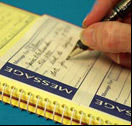 |
|
![]()
 Listen to a telephone conversation and complete the information.
Listen to a telephone conversation and complete the information.
|
Caller's Name: Company: Telephone / fax: Message: Action: Taken by: Tania Lpez Date: 24th March 2005 |
 |
|
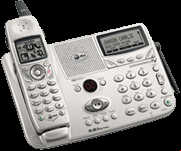 |
|
![]() Listen to five recorded messages and decide what the message is about.
Listen to five recorded messages and decide what the message is about.
![]() Listen again and answer the questions.
Listen again and answer the questions.
![]() Listen again and read the transcription.
Listen again and read the transcription.
| |
|
En un contestador automtico... Grabe su mensaje para las llamadas entrantes solicitando de forma concreta la informacin necesaria cuando sea relevante. - We are not here at the moment. Please leave your name, your company and your phone number after the tone and we'll call back as soon as possible. o bien un mensaje general: - We are unable to take your call at the moment. Please leave your message after the tone. Para dejar un mensaje: - I'm returning your call. |
| |
|
to receive a call: recibir una llamada |
5) DIFERENCIAS DEL INGLS BRITNICO Y EL INGLS AMERICANO
| INGLS BRITNICO | INGLS AMERICANO |
| - Los nmeros suelen ir separados por espacios. 34 123 279 486 |
- Los nmeros suelen ir separados por guiones. 34-123-279-486 |
| - "0" (cero) se pronuncia como "oh" | - "0" (cero) se pronuncia como "zero" |
| - Se pronuncia "Double" o "Triple" para nmeros que se repiten. 2-617-633-7754 = "Two, six one seven, six double three, double seven five four" |
- Cada nmero se pronuncia por separado. 2-617-633-7754 = "Two, six one seven, six three three, seven seven, five four” |
| - The line is engaged. | - The line is busy |
 British English |
 American English |
|||
|
To ring (s.o.) To ring up (s.o.) To ring (s.o.) up To give someone a ring |
To call (s.o) To call up (s.o) To call (s.o.) up |
|||
| To give (s.o.) a bell To give (s.o.) a buzz |
|
informal | (s.o.= someone) |
|
6) TELEPHONE PHRASAL VERBS

![]()
![]() Match the phrasal verbs on the left with the correct meanings. Follow the example.
Match the phrasal verbs on the left with the correct meanings. Follow the example.
![]()
![]() Decide if the following sentences are true or false.
Decide if the following sentences are true or false.
![]()
![]() Complete the following sentences with a phrasal verb from exercise 1 in the correct tense.
Complete the following sentences with a phrasal verb from exercise 1 in the correct tense.
|
1. I don’t have my ant’s number with me, but I’ll it when I get home and I’ll you. 2. It’s not easy to to the hospital. The line’s always busy. 3. I’m afraid I can’t hear you, can you please? 4. Just a moment sir, I’m you to our sales department. 5. Hello, it’s me again, I think we got . 6. This is a terrible connection. Look, why don’t you and I’ll you . 7. I’m afraid Mr. Gomez isn’t at his desk at the moment. If you’d like to for a moment, I’ll see if I can find him. 8. I wish someone would the phone. It’s been ringing for ages. |
 |
Transcription
 |
- I’ll give Simon a ring and see if he’s busy. - Can you ring me tomorrow morning? - When’s a good time to give you a ring? - I’ll give you a buzz as soon as I get to the hotel. - What time is she going to phone? - Call me sometime. - Would you mind ringing Jane for me and see if she’s finished the report? |
* Accede a ms Phrasal Verbs en ingls.
 |
|
Telephone English
Reza and Craig agree that speaking on the phone in a foreign language is one of most difficult things to do. You can’t see the other person, so you have no body language, hand gestures or facial communication.
* Accede a ms Podcast en ingls.
RECURSOS
- Descarga e imprime nuestras Accede a nuestra gua orientativa para conocerlos.
 |
un conjunto de recursos e ideas que te ayudarn a aprender y mejorar el ingls. |
TAMBIN TE PUEDE INTERESAR:
La Mansin del Ingls. https://mansioningles.descargarjuegos.org
Copyright La Mansin del Ingls C.B. - Todos los Derechos Reservados . -
Cmo puedo desactivar el bloqueo de anuncios en La Mansin del Ingls?


